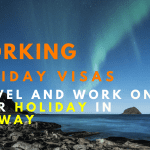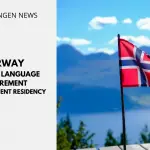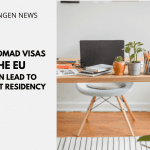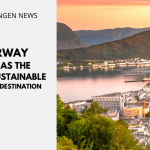How to Apply for a Norway Schengen Visa from the UK
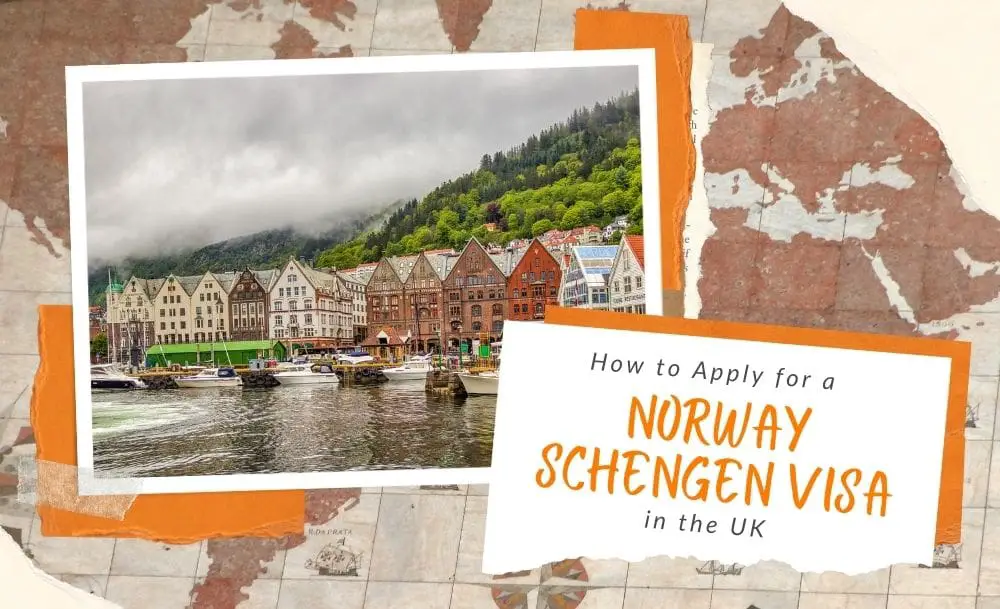 [su_spoiler title=”Contents In this Article” icon=”plus-circle”]
[su_spoiler title=”Contents In this Article” icon=”plus-circle”]
- Norway Entry Restrictions in Response to Coronavirus
- Who needs a visa to travel to Norway from the UK?
- Steps to Applying for a Norwegian Schengen Visa from the UK
- Norway Schengen Visa Application Decision
- Norway Schengen Visa Extension
- Norway Schengen Visa Frequently Asked Questions

Norway offers visitors an incredible mix of cultural and natural wonders. From cosmopolitan Oslo to its endless snow-capped mountain peaks and deep fjords, there's no end of choices for travellers in the land of the midnight sun and stunning northern lights.
It’s easy to picture pillaging Vikings and scenic fjords when thinking about Norway. This land of the summer midnight sun, however, offers much more than that, including picturesque waterfronts, well-preserved wooden churches and great hiking trails. Quaint medieval towns, filled with modern amenities, are just waiting to be explored.

Norway Entry Restrictions in Response to Coronavirus
In early 2020, Norway joined the rest of its Schengen country neighbours in closing its borders due to the COVID-19 pandemic. The country has since partially reopened its borders, with conditions.
Only travellers belonging to the following categories can enter the country:
- Norwegian citizens
- Residents in Norway
- Foreign travellers who are residents of a country or area classified as “green”, “orange”, “red”, “dark-red” and “purple” from Norway's list of countries
Travellers who wish to enter Norway must do the following:
- Complete the registration form not more than 72 hours before travelling to Norway
- Submit to rapid antigen test upon arrival in Norway
- Enter a 10-day quarantine period at home or another suitable place of residence
Children and young people under the age of 18 are not required to undergo quarantine but it is encouraged to take a test 3 days after arrival.
Coronavirus Restrictions for UK Travel to Norway
Travellers who are fully vaccinated (7 days after your last dose) with a vaccine approved by the European Medicines Agency and in possession of an English, Welsh, Northern Irish or Scottish NHS COVID Pass with a verifiable QR code and those who can prove they have recovered from COVID-19 during the past six months are allowed to travel to Norway.
Travellers with a valid QR coded NHS COVID Pass will not be required to provide evidence of a negative test on arrival, complete an entry registration form, be tested at the border or quarantine after arrival. Norway also accepts the EU digital COVID certificate as proof of vaccination or previous illness.
You should check on the latest news regarding restrictions, quarantine or whether a test will be required either from reliable news sources, the Norwegian government website, or the UK government website one to two weeks before your trip to be aware of the latest requirements for travelling to Norway.
EU Digital COVID Certificate
The EU Digital COVID Certificate was available starting 1 July 2021, provides proof that a person has either:
- been vaccinated against COVID-19
- received a negative test result, PCR or rapid antigen,
- or has recovered from COVID-19
The EU Digital COVID Certificate grants travellers the same rights as vaccinated, tested or recovered citizens of the EU Member State they are visiting and allows travel into the EU.
EU citizens and residents can have their Digital COVID Certificates issued and verified across the EU. You can find out about how Norway is handling their EUDCC on their website.
Who needs a visa to travel to Norway from the UK?
Travelling to Norway for EU/EEA Citizens
Norway is a Schengen country, which allows for free movement between the 26 EU and EFTA states (Iceland, Norway, Liechtenstein, and Switzerland). A uniform Schengen visa issued by one of the Schengen states is valid for travel within the whole Schengen area.
Travelling to Norway Post-Brexit for UK Citizens
The rules for travelling or working in European countries changed on 1 January 2021:
- you can travel to countries in the Schengen area for up to 90 days in any 180-day period without a visa as a tourist, to visit family or friends, to attend business meetings, cultural or sports events, or for short-term studies or training
- if you are travelling to Norway and other Schengen countries without a visa, make sure your whole visit is within the 90-day limit. Visits to Schengen countries within the previous 180 days before you travel count towards your 90 days
- for long-stay visits, to work or study, for business or for other reasons, you will need to meet the German government’s entry requirements.
- if you stay in Norway with a residence permit or long-stay visa, this does not count towards your 90-day visa-free limit
- show a return or onward ticket
- show you have enough money for your stay
There are separate requirements for those who are residents of Norway. If you are resident in Norway, you should carry proof of residence as well as your valid passport when you travel. You should also check your passport’s validity when you travel and renew it if you don’t have enough time on it. Your passport must be:
- valid for at least 3 months after the day you plan to leave Norway or any other Schengen country
- less than 10 years old
Travelling to Norway Post Brexit for Other Third Country Citizens
Citizens of the following countries residing in the UK and planning to visit Norway are required to get a Hungarian Schengen visa in order to be able to enter Norway. [su_tabs][su_tab title=”A-C”][su_table]
| Afghanistan | Algeria | Angola |
| Armenia | Azerbaijan | Bahrain |
| Bangladesh | Belarus | Belize |
| Benin | Bhutan | Bolivia |
| Botswana | Burkina Faso | Burma/Myanmar |
| Burundi | Cambodia | Cameroon |
| Cape Verde | Central African Republic | Chad |
| China | Comoros | Congo |
| Cote D'iviore | Cuba |
| Dem. Rep. Of Congo | Djibouti | Dominican Republic |
| Ecuador | Egypt | Equatorial Guinea |
| Eritrea | Ethiopia | Fiji |
| Gabon | Gambia | Ghana |
| Guinea | Guinea-Bissau | Guyana |
| Haiti | India | Indonesia |
| Iran | Iraq |
| Jamaica | Jordan | Kazakhstan |
| Kenya | Kosova | Kuwait |
| Kyrgyzstan | Laos | Lebanon |
| Lesotho | Liberia | Libya |
| Madagascar | Malawi | Maldives |
| Mali | Mauritania | Mongolia |
| Morocco | Mozambique | Namibia |
| Nepal | Niger | Nigeria |
| North Korea | Northern Mariana's | Oman |
| Pakistan | Papua New Guinea | Philippines |
| Qatar | Russia | Rwanda |
| Sao Tome And Principe | Saudi Arabia | Senegal |
| Sierra Leone | Somalia | South Africa |
| Sri Lanka | Sudan | Suriname |
| Swaziland | Syria | Tajikistan |
| Tanzania | Thailand | Timor-Leste |
| Togo | Tonga | Tunisia |
| Turkey | Turkmenistan | Uganda |
| Uzbekistan |
| Vietnam | Yemen | Zambia |
| Zimbabwe |
Before starting a visa application, or getting a flight to Norway, make sure to check whether you need a visa to Norway or not.
If you have a 3-month UK visa you can extend it for three more months in order to be eligible to apply for a Norway Schengen visa from within the UK. You must apply for an extension before your visa expires and while you’re still in the UK.
Note: You can stay in the UK until the decision about the extension is taken, but only if you have applied within the visa period.
You should apply for a Norway visa at the appropriate Norway Embassy/Consulate or Norway visa application centre in the UK if:
- Norway is the only Schengen country you plan on visiting
- Norway is your main destination (the country you will be staying the longest in)
- Norway is the first Schengen country you are visiting (when spending an equal amount of days in The Norway and another Schengen country)
In case you plan on staying in Norway for more than 90 days you must apply for a residency permit, not a Norway Schengen visa.
Please, note that if you are not a resident in the United Kingdom you should apply at the Norway Embassy/Consulate/VAC in your home country of residence.

Steps to Applying for a Norwegian Schengen Visa from the UK
Step 1: Know your visa type and validity
There are 2 types of Schengen visas that you can apply for. The one you need will depend on the duration of your trip and your reason for travelling to Norway:
- Short-stay (Schengen) Visa – valid for up to 90 days (in a 180-day period) for the purposes of tourism, business, visiting family/friends, conference, EEA/EU national family member
- Residence and work permits (Long stays) – you should apply for this kind of visa if you want to live in Norway for more than 90 days for employment, family reunification, study, research etc.
Step 2: Identify where to make application and book an appointment
To apply for a Norway Schengen visa, you must book an appointment with the Norway Embassy in London.
You can do this through the following:
- Book it yourself through VFS Global
- Use a service like IaM who will also make sure that your application will have the best chance of being approved
Step 3: Complete your application form
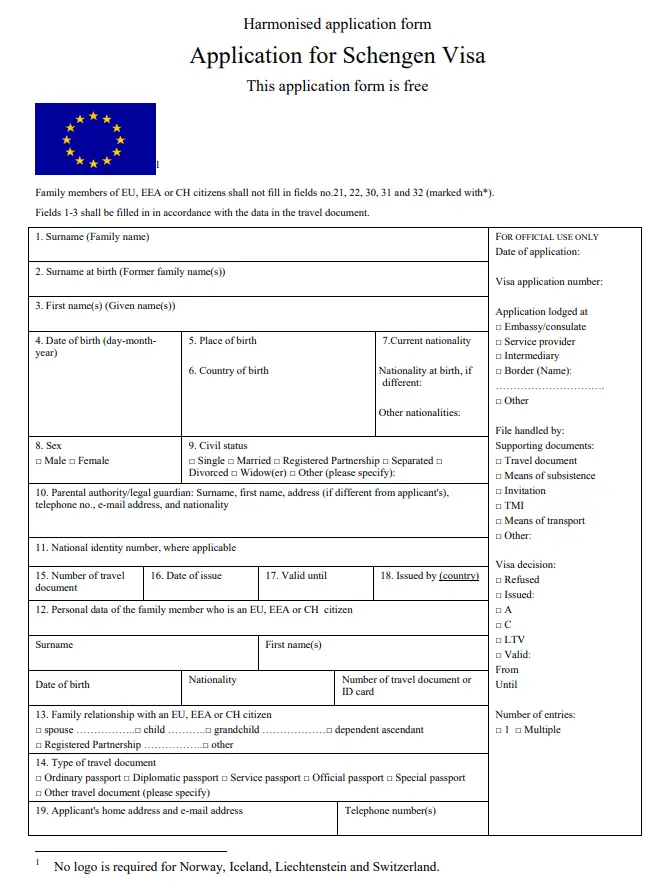
The Schengen visa application form contains questions about you including:
- Name and surname
- Date and place of birth
- Nationality
- Sex and marital status
- National Identity number
- Passport number
- Home address and email
- Purpose of trip
- Question regarding previous trips to Schengen, if any
- Intended date of arrival in Schengen area you are visiting, and the intended period of stay
- Cost of traveling and remaining in Schengen area you are visiting, who will cover them, etc.
Make sure your answers are correct and that they comply with the information in the rest of the documents. Complete the form, print it twice, and sign both copies at the end.
Find out more about how to complete a Schengen vis application form in this blog post.
Step 4: Prepare your documents
The following list of documents are required in order to obtain a visa to Norway in the UK:
- A valid passport or travel document. Please make sure:
- Your passport has been issued within the previous 10 years,
- Your passport has 2 full blank pages, one for the visa stamp and an additional spare page,
- Your passport will be valid for at least three (3) months after the date you exit the Schengen Area.
- A valid UK residence permit or other form of Identity Card.
- The UK residency permit must be endorsed in the actual passport (or on a new biometric ID card)
- The UK residence permit must be valid for at least another three more months beyond the date you plan to leave Norway.
- One Norway Schengen visa application form filled out completely and signed by the applicant.
- One recently taken passport format photo with a blank background and where all your facial features are clear, which must be glued to the application form. Applications with stapled photographs will be rejected.
- A cover letter explaining the purpose of the visit to Norway
- Biometric data (Applies only if you haven’t provided biometric data within the last 59 months):
- Fingerprints
- A copy of the passport bio page where the photo is included.
Note: Children under the age of 12 are exempted from providing fingerprints.
- Proof of travel arrangements:
- Round trip flight/travel reservations or other proof of intended transport
- Complete itinerary of your visit to Norway (if several Schengen States will be visited or if the trip covers several Schengen States and non-Schengen countries)
- Travel Insurance stating that you are covered in case of a medical emergency and repatriation not just in Norway but in the whole Schengen zone (minimum coverage of € 30,000).
- Holders of diplomatic passports and family members of EU/EEA citizens are exempted from providing proof of travel medical insurance
- Proof of accommodation in Norway:
- Evidence of a hotel booking or rental agreement, or
- Invitation from your host in Norway (family member, friend) with a copy of their passport
- Proof of financial subsistence:
- According to the information provided by the European Commission, a foreign national who wants to enter the territory of Norway, while applying for a Norway visa it needs to attest owning 48€/day for the period of stay in Norway
- Original recent Bank Statement (covering the last 3 calendar months. The last transaction must be no more than 1 month old)
- Traveller’s Cheques
Note: Cash is not considered proof of financial subsistence.
- Certificate of criminal record of the home country– showing that candidate has no open crime case involvement
- Proof of paid Norway visa fee.
Note: Photocopies of the original documents should also be submitted and documents should not be more than one month old.
The documents listed above are documents required in all cases, regardless of the purpose of your visit to Norway.
Additional documents required for your visa application based on employment status

For employees:
- Employment contract
- Current bank statement of the latest 6 months
- Leave permission from the employer
- Income Tax Return (ITR) form or Certificate of Income Tax deducted at the source of salary
For the self-employed:
- A copy of your business license
- Company bank statement of the latest 6 months
- Income Tax Return (ITR)
For foreign students in the UK:
- Proof of enrollment
- No-objection certificate from school or university
For retirees:
- Pension statement of the latest 6 months
If unemployed and married to an EU citizen:
- A recent (less than 3 months old) Confirmation of Employment letter from their spouse’s employer stating the position held within the company as well as the starting date,
- Spouse’s valid passport
- An officially translated marriage certificate. The translation must be in English or Norway and must be certified as a true copy by the Embassy of the country where the marriage took place or by the Legalization Bureau of the Foreign Office in UK
Requirements for children under the age of 18:
Parents or an adult guardian are required to accompany their underage children to the application centre at the Embassy of Norway in London. Also, minors who are granted a Norway visa are not allowed to travel to Norway by themselves. They should be accompanied by an adult during their stay in Norway.
Apart from the general documentation required, accompanying should be other additional documents depending on the purpose of your Norway Visa application.
Additional documents required for the most frequent purposes of Norway visa application
Norway Tourist/Visitor Visa:
- Invitation letter from your family or friends in the Norway with the address and phone number – if applicable
- Bank statement of the last 6 months
- Passport copies
Norway Visa for Business Purposes:
- Invitation letter from the Norway company you will be visiting and their detailed address accompanied with the dates of your visit
- A certificate from your employer stating/allowing your business travel
- If there were previous trade relations between the two companies, proof of such events must be provided
- Business bank statement of the latest 6 months
- Memorandum and Article of Association in original certified copy (registered with joint stock companies) Trade License (first issued and present renewal), Proprietorship/Partnership documents
- Regarding the applicant’s expenses during stay in the Schengen zone, either the employer or the partner company must state coverage of expenses on the letter or invitation.
Norway Visa for Medical Purposes:
- A local medical report
- A medical attestation from the hospital or doctor in Norway, confirming the date of your appointment as well as your medical situation
- Payment receipt of medical fees
Norway Visa for Cultural, Sports, Film Crew or Religious Purposes:
- Invitation letter from the above-mentioned authorities with details upon the nature of events or activities – purpose of visit, expense coverage
- Names of the applicants (crew members)
- Duration of stay
- Travel itinerary
Norway Visa for Members of Official Delegations:
- The official invitation copy
- Identity of applicant
- Purpose of journey (negotiations, meetings, event by intergovernmental organizations, consultations)
- Duration of stay
- Place of accommodation
Norway Visa for Study, Training, Research, or other types of Internship Purposes:
- An enrollment certificate allowing attendance of courses
- Certificate of completion or courses attended
- Financial sustenance
Norway Airport Transit Visa:
- Visa or other type of entry permit in the transit country
- Copy of your valid visa for your final destination

Required documents for visa application for underage children
- Birth certificate
- Norway Schengen Visa application form should be signed by both parents.
- Family court order, in cases where only one parent has full custody over the child.
- Certified copies of ID / passport of both parents
- A notarized parental authorization to travel to Norway, signed by both parents / guardians, if the minor will be travelling alone with another person.
All documents provided should be legalized and be in of the following languages:
- English
- Norwegian
Step 5: Attend your appointment
On the day of the interview, show up at the appointment centre on time (embassy or consulate). Remember that if you are late even for a few minutes, then they will probably cancel your appointment. Try wearing something a bit more official, but comfortable.
The Norway visa interview takes around 10 minutes to complete. During this interview, the consular officer will ask you several questions about you and your intended trip. You will also be submitting the required documents throughout the meeting, to the interviewer.

After your application is verified, the information will be entered into the online system of the consulate or embassy and you will receive a printed copy of your application, which process usually takes about 10 to 15 minutes. After you get the printed form, please make sure to verify all the details are correct and sign the form.
Underage applicants must be accompanied by their parent or legal guardian.
Norway Schengen Visa Fees for UK Residents
Since Norway is a Schengen country, the visa fees are the same as any other Schengen visa.
The fee must be paid upon submitting the Norway visa application. After you complete this payment, you will receive a receipt, which shows that payment has been made, which must be offered amongst other documents of the application dossier. You will have to pay a Norwegian visa fee in order for your application to be processed.
Find out about the Schengen visa fee in our blog post: Schengen Visa Fees – How Much Does a Schengen Visa Cost?
Norway Schengen Visa Fee Exemptions
The following categories of applicants are exempted from Norway Schengen visa fees only:
- Children younger than 6 years of age
- Family members of an EU/EEA national
- Documents required for exemption:
- Original Marriage Certificate, or
- Civil Partnership Certificate
- Original full Birth Certificate
- EU/EAA national’s passport.
- Documents required for exemption:
- Persons travelling for the purpose of study or educational training
- School pupils*
- Undergraduates and postgraduates*
- Researchers from third countries
Norway Schengen Visa Fee Discounts
The Norway visa fee is discounted to 35€ (30 £) for the following:
- children aged between 6 and 12 years
- and nationals of the following countries:
- Azerbaijan
- Georgia
- Russia
- Ukraine
Step 6: Receive your visa
Visa Application Processing Time in UK
You can apply for a Norway Schengen Visa 6 months before your planned trip. Depending on the nationality of the applicant, the processing time may take at least 15 days from the day of application. In some cases when required documents are missing from the application, this process may take longer.
Therefore, to avoid unwanted complications, the Norway Consulate General in London advises that you provide all required documents and submit your application at least 20 workdays (4 weeks) before the day you leave for Norway.
Norway Schengen Visa Application Decision
- Approved – Once your visa is approved, it will be stamped in your passport. Make sure to carefully check the visa sticker to make sure everything is correct and exactly how you need it.
- Rejected – if your visa has been rejected, it would have been for a specific reason and you have the right to appeal.
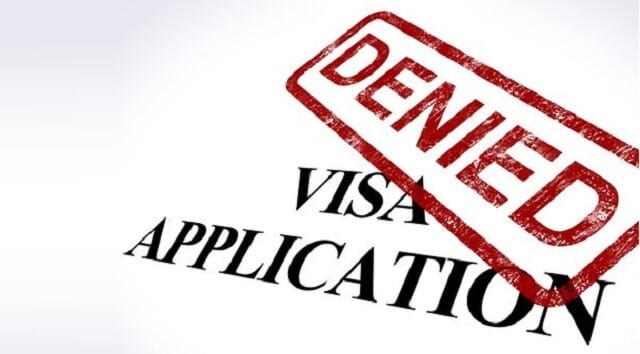
Common Norway Schengen Visa Rejection Reasons
- Marriage certificate missing – if you are applying for a visa for family reasons, you may have to prove family ties. This is why you must provide a marriage certificate
- You applied for the wrong visa – it is your responsibility to apply for the correct visa depending on how long you are going to Norway for and your reason for travelling there
- It is not clear that you plan to return to the UK – it must be clear that you intend to return to the UK before the visa expires. If the visa staff have doubts about this, your visa will be rejected
- The purpose of your trip cannot be established – the reason why you are planning to go to Norway must be made clear. You can do this by providing specific documents like a full itinerary, work contract or invitation letter, etc.
What If My Norway Schengen Visa Is Rejected?
If you receive a negative answer in your Norway Schengen visa application, this does not mean you cannot ever travel to Norway. You have two options.
- File an appeal for a Norway Schengen visa rejection if you believe that the decision to deny you a visa is unjust. You should have a strong basis for your complaint. You can appeal this decision by writing an appeal letter for a Norway Schengen visa rejection.
- Reapply by correcting the mistakes you did in your previous application. Or improve your situation to comply with the eligibility criteria for a Norway Schengen Visa.
Norway Schengen Visa Extension
A person visiting Norway on a Schengen visa is allowed by law to extend their visa if they have legitimate reasons. This could be either personal, professional, medical, emergency, or for other reasons. The decisions to approve a Schengen visa extension request are handled case by case.
The duration you are allowed to stay in the country is stated in your Schengen visa sticker. It is important not to overstay during your trip to Norway or the rest of the Schengen Zone or risk facing penalties like a fine, deportation, being banned from travelling back to the Schengen Zone, and having difficulties in your future Schengen applications. There are also cases when people do not get any penalties for overstaying, for example, a child or a person that cannot travel without a caretaker because of an illness or disability or an unforeseen event that prevents you from leaving the country, like COVID-19.
Find out more about overstaying in the Schengen visa in our blog post.
Schengen Visa Extension Application Process
If you wish to extend your visa and stay longer in the Schengen Zone, then you need to start getting ready for your application. The overall process of extending your Norway Schengen visa will involve:
- Determining whether you have a justified reason to request for an extension
- Submitting all the necessary documents. These include a valid passport that has the Schengen Visa used to get in the Schengen area stamped in it, one passport-sized photo, proof of financial subsistence, Schengen Visa Insurance that covers the extension duration, and all the documents that justify your reason for an extension
- Paying visa fees where applicable
- Attending a visa interview if necessary
- Waiting for the approval
You must apply for a Schengen visa extension before it expires. It may take a few days to a month for the authorities to process your visa extension request, during which you are legally permitted to stay in the country where you applied for the Schengen visa but cannot travel to other Schengen countries. If your visa extension request is approved, you can extend your stay in the Schengen Area until the visa validity. If your visa extension application is rejected, you will have to leave the Schengen area as soon as possible.

Norway Schengen Visa Frequently Asked Questions
Is a Norway Schengen visa easy to get?
Yes, it's easy to apply for a Norway Schengen visa! You can apply for the visa online or use immigration services like IAM to make the process even simpler for you and have a higher chance of your application being accepted.
How long does a Norway Schengen visa take to process?
You can apply for a Norwegian Schengen visa up to 180 days before your planned trip. The Norwegian visa application process takes a minimum of 5 working days but can take up to 2 weeks. We advise you to make your application 3 weeks before your trip to make up for any possible delays in processing.
How much is a Schengen visa for Norway?
The fee for a Norwegian Schengen visa is 80€ for adults, 40€ for children between 6-12 years of age, and free for children younger than 6 years of age. Keep in mind that these fees may change depending on currency fluctuations and can be paid only in UK Pounds. Payments can be made in cash and by credit or debit card.
How can I get a Norway Schengen visa fast?
You can get a premium Schengen visa to get your German Schengen visa within 24 to 48 hours, which includes personalised advice from an expert immigration adviser.
How much money do I need to show in my bank account for a Norway Schengen visa?
According to the information provided by the European Commission, you need to have 48€/day for the period of stay in Norway.
Can I use Euros in Norway?
No, Norway has its own currency called the krone so you will need to convert your Euros or other currency when you travel into the country.
Can I use credit cards in Norway?
Yes you can. Norway is known to have one of the most cashless societies. Most establishments will accept debit and credit cards.
What other countries can I travel to on a Norway Schengen visa?
You can travel to any of the 26 countries in the 18 other countries.
Ready to apply for your Norway Schengen visa? Is there anything we missed or anything you need clarification on? Comment below.
IaM can help with your visa application to the United States, the UK & other countries
If you need help with a US visa, a UK Visa, or visa to Europe, including help with appointment booking obligations, IaM can help. For more information and advice on US immigration, UK immigration law and US visa applications or if you need any help or assistance please, reach out to your Visa Coordinator at IaM.
- How to Apply for a Luxembourg Schengen Visa from the UK - 14 March 2025
- How to Apply for a Liechtenstein Schengen Visa from the UK - 13 March 2025
- Austria Schengen Visa Requirements for UK Residents - 11 March 2025

